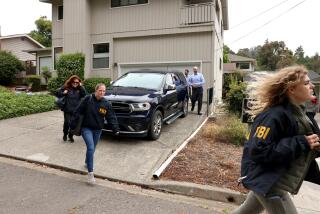Campbell Accused of Using Influence to Aid Contributor
- Share via
State Sen. William Campbell (R-Hacienda Heights) repeatedly put pressure on officials in the state architect’s office to continue employing an asbestos-removal consultant who was also a major campaign contributor, a former employee of the firm charged Sunday.
Campbell, a senior Orange County legislator, could not be reached for comment Sunday, nor could officials of the state architect’s office.
But Gordon Goldman, president of Asbestos Environmental Controls Inc. of New Orleans, called the charges by former employee Terrence McQuade “absolute falsehood.”
‘Never Gotten Into Any Problem’
“Consider the source,” Goldman continued, noting that McQuade was recently fired. “I’ve never gotten into any problem with the state architect’s office, so I’ve never asked him (Campbell) to intercede.”
Goldman said that his national consulting firm had been working with the state architect’s office since 1985, 18 months before he met Campbell.
The firm, with offices in Riverside, New Orleans and Chicago, develops plans for removing asbestos from buildings and monitors the process, by taking air samples, for instance. But the firm does not remove the hazardous material itself.
Goldman said that officials at the state architect’s office told him last week that AEC had done “the best job of any consultant.” He also briefly criticized his “disgruntled employee,” McQuade.
In a brief interview from his New Orleans home, Goldman acknowledged that he had loaned Campbell a car and a driver “just for a day” during last year’s Republican National Convention in that city. Campbell, however, did not report the gift on financial statements as the law requires, according to records.
Not including the loaned car and driver, the AEC firm contributed $27,000 to Campbell campaign committees in 1987 and 1988, records show.
And McQuade, former supervisor of AEC’s Riverside office, said the firm was rewarded for its generosity.
“Whenever he (AEC President Goldman) got into trouble (meeting deadlines) and he couldn’t talk his way out of it . . . he would just call Sen. Campbell and tell him what the problem was,” McQuade charged. “And then Campbell would give a call to the powers that be at the state architect’s office and tell them to lay off.”
Both McQuade and Goldman recounted a conversation last February in which Kenneth McClellan, of the state architect’s office, talked with them about continuing to work with AEC:
“ ‘Well, I don’t mind--as long as I don’t get any more calls from your friend (Campbell),’ ” McClellan reportedly told them.
According to McQuade’s account, Goldman responded with a chuckle and promised, “ ‘No, no, you won’t get any more calls. Unless you give me reason to.’ ”
According to Goldman’s account, however, it was not he but McClellan who mentioned seeking help from lawmakers. Goldman said McClellan turned to him and asked him to “intercede with any legislator” to defeat a bill that would close the state architect’s office for a year.
Meanwhile, the 28-year-old McQuade--fired and currently unemployed after being involved in a fatal accident while driving a company car--claimed AEC was a struggling firm. Even though it held major contracts, including a $260,000 agreement with the state architect’s office, AEC frequently had trouble meeting deadlines, McQuade charged.
According to McQuade, Goldman often called on his “very good friend,” Sen. Campbell for help with the state architect’s contract. In return, McQuade said, Campbell consulted regularly with AEC’s Goldman on legislation that dealt with asbestos.
Claimed McQuade: “Goldman has told me that Sen. Campbell doesn’t do anything about asbestos without talking to Goldman. If it’s agreeable to Dr. Goldman, then it’s agreeable to Sen. Campbell.”
Campbell in April introduced a bill requiring that all asbestos abatement consultants be licensed. The bill was sponsored by the California Asbestos Abatement Business League and the Building and Construction Trades Council of California.
McQuade said the bill would benefit larger firms such as AEC because “for the short run it would create more business for our company. It would eliminate all those small firms while they’re going through certification.”
Times staff writer Daniel Weintraub contributed to this report.
More to Read
Get the L.A. Times Politics newsletter
Deeply reported insights into legislation, politics and policy from Sacramento, Washington and beyond. In your inbox twice per week.
You may occasionally receive promotional content from the Los Angeles Times.










